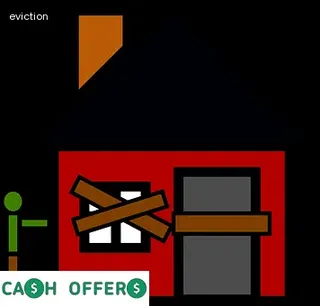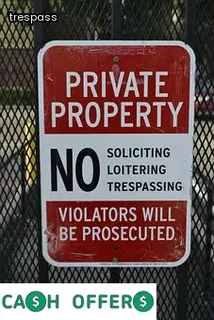Squatting laws in North Dakota can be complicated and difficult to navigate. In order to understand a squatter’s rights in the state, one must first familiarize themselves with the relevant statutes and case law.
Squatters may occupy a property without permission from the owner if they are able to prove that they had adverse possession for a certain period of time. The amount of time required varies based on a variety of factors including whether the squatters are paying taxes on the property, the relationship between them and the property owner, and their intention when taking up residence.
Additionally, squatters must also show that they have made ‘open, exclusive and continuous’ use of the land in order to establish ownership. As such any parties who wish to purchase or claim ownership of an unoccupied property should understand these laws before entering into an agreement.

Squatters’ rights and adverse possession are two distinct legal concepts commonly misunderstood in North Dakota. Squatters’ rights refer to a party occupying a property without the permission of the owner, usually without any payment of rent.
Adverse possession is more complex; it requires that an individual occupy someone else’s land in an open and notorious manner for a set period of time with the intent to claim ownership. In North Dakota, this period is 15 years.
To acquire legal title through adverse possession, the individual must pay all taxes assessed on the property during their occupancy. Squatters do not have to pay taxes in order to maintain their rights over the property; however, they can be evicted by law enforcement at any time.
It is important to understand these distinctions when uncovering North Dakota squatter's rights and seeking home ownership.
North Dakota's Color of Title Doctrine is an important part of understanding the rights of squatters in the state. This doctrine outlines a set of legal requirements that must be met in order to establish a squatter's right to ownership.
The most critical components include demonstrating possession, payment of taxes, and public record notice. Possession must be established through either actual or constructive occupation coupled with significant improvements to the property.
Payment of taxes is essential as overdue taxes can be used to invalidate any claim made by a squatter. Lastly, proper public record notice is needed in order to inform third parties of the claim being made on the property.
All these elements need to be met in order for a squatter's rights to be recognized under North Dakota law.

When it comes to living in North Dakota as a squatter, there are tax implications that need to be taken into consideration. Squatters may not own the land they are residing on, but they may still owe taxes on the property depending on where they are located.
It is important to understand that some local governments may require squatters to pay taxes, while other areas may have exemptions or special provisions for them. Additionally, different counties and municipalities have different regulations when it comes to taxing squatters so it’s important to research your local area before taking up residence as a squatter.
Property taxes are generally based on the value of the property and can vary greatly depending on location and other factors. Some counties may also provide tax credits or deductions for squatters who take up residence in certain areas.
Understanding these tax implications is key when considering taking up residence as a squatter in North Dakota.
When it comes to removing a squatter from your property, there are a few strategies that can be taken. The first step is to issue an eviction notice that states the squatter must leave within a certain amount of time as specified by North Dakota laws.
If the squatter does not comply, you can then file a complaint with the court, who will review the case and decide whether or not the occupant has rights to remain on the property. Additionally, if the squatter has caused any damage to the property, you may also be able to seek legal action for reimbursement.
Once an order of eviction is issued by the court and served to the occupant, they must vacate within a set period of time or face legal repercussions. Landowners should also note that squatters may have some rights under North Dakota law and it is important to investigate these thoroughly before taking any steps towards removing them from your property.

It's important to be aware of your rights as a homeowner in the event of an unwanted occupation. North Dakota is no exception, so it's beneficial to familiarize yourself with the state's laws on squatter's rights.
Knowing the regulations and resources available can help protect you from any potential issues, such as a squatter filing an adverse possession claim on your property. Local government offices, such as county courthouses or state attorney general offices, are good places to start learning about relevant laws and regulations.
Additionally, it can be helpful to consult a lawyer who specializes in real estate law to get legal advice related to squatter's rights in North Dakota. Understanding your legal obligations is key when dealing with unwanted occupants, so researching squatter’s rights and consulting professionals for advice can help you feel secure in your home ownership situation.
Across the United States, the legal landscape of squatters' rights can vary drastically from state to state. In North Dakota, understanding and uncovering a squatter's rights can be an intimidating process, but with a thorough understanding of home ownership and tenants’ rights, it is possible to secure a home without traditional methods of purchase.
Squatting in North Dakota is not as common as other states like Texas or California due to its harsher climate and regulations, but those who live in rural areas may have more success due to less regulation and enforcement. It is important for potential squatters to understand the laws that govern their particular situation before trying to establish residency on another person’s land or property.
Knowing the statutes that protect both landlords and tenants can help ensure that no one’s rights are violated in the process. Additionally, it is essential for squatters in North Dakota to understand how they will acquire electricity, running water and sewage services as well as how they will pay for such utilities if they are not already accessible on the property.
With careful research and understanding of local regulations, those seeking an alternative form of home ownership in North Dakota can find success by uncovering their squatter's rights.

When it comes to uncovering North Dakota squatter's rights, one of the most important questions to ask is whether or not there are exceptions to the rule of adverse possession. In North Dakota, certain exceptions may apply when it comes to a squatter's ability to gain ownership of property.
These exceptions include cases where the owner still has an interest in the property and can prove they had no intention to relinquish their rights to it, as well as instances in which a mineral interest was involved in the transaction. Another exception that may be applicable is if a deed has been issued improperly or fraudulently.
Even if a squatter had possession of the land for some time, they may not be able to establish ownership under these circumstances. Additionally, any legal action taken against a squatter must be done within one year of discovery and with due diligence.
It is essential for anyone looking into North Dakota squatter's rights to understand all applicable exceptions in order to make an informed decision about pursuing home ownership through adverse possession.
When considering whether to allow a squatter onto one’s property, it is important to assess the potential risks and consequences. Though some North Dakota squatters may be peaceful and respectful of the landowner's rights, there are many who can become detrimental to the property’s security and value.
Without a legal agreement in place, they may refuse to leave or even damage the property once they are allowed onto it. Landowners should also consider that if a squatter has been residing on their property for a certain amount of time, they might be able to claim adverse possession-- meaning they could gain legal rights to the land without any compensation for its owner.
In addition, allowing a squatter on one’s property could lead to disagreements about who is responsible for utilities and other expenses related to the upkeep of the property. Ultimately, it is important for landowners in North Dakota to understand what risks come with allowing a squatter onto their land when considering how best to protect their rights and investments.

When it comes to avoiding unwanted occupancy of a property, there are several practical considerations that should be taken into account. First and foremost, it is important to ensure that North Dakota's squatter laws are properly understood.
This includes researching the applicable statutes, examining relevant court rulings and consulting with an attorney who specializes in land use law or tenant rights. Additionally, it is wise to make sure that the ownership of the property is clear, as squatters may try to establish residency based on an out-of-date deed or other document from the past.
Finally, it is essential to take steps to secure the property against uninvited guests; this could include installing locks and fencing around the perimeter of the lot or posting notices warning trespassers away. By staying informed about North Dakota's squatter laws and taking sensible precautions, homeowners can help protect their properties against unwanted occupancy.
When it comes to uncovering North Dakota squatters’ rights, understanding when it is appropriate to pursue legal action against a squatter is essential. Before considering legal action, you should ensure that the person occupying your property is indeed classified as a squatter and not a tenant or guest.
Squatters are individuals who occupy and reside on another person’s property without the owner’s permission or a court order. If the individual has made changes to the property, such as improvements or unauthorized repairs without consent, then they are more likely considered a squatter.
Furthermore, if an individual has been living on your land for an extended period of time without paying rent or receiving any sort of compensation in return, they may be classified as a squatter. Once you have determined that appropriate legal action against the individual is necessary, then you may continue with the process.
You must first contact the local police department and file an official complaint before you can go ahead with any other steps in order to remove them from your property.

Navigating your rights as a landowner in North Dakota's Adverse Possession laws can be confusing. Knowing the facts is an important step to understanding and protecting your rights when it comes to squatter’s rights in North Dakota.
It is important to understand how North Dakota law applies to squatters and landowners, as well as how you can claim ownership of land through adverse possession. Squatters have certain rights under North Dakota law, such as the right to repair and maintain land they are occupying, but they must follow specific rules to acquire title by adverse possession.
Landowners should be aware of these rules so they can protect their property against unwanted occupants. Additionally, understanding the process for filing an action for ejectment or forcible entry and detainer can help landowners protect their rights if a squatter unlawfully occupies their property.
Taking steps such as providing notice or documentation of ownership or possession may also be beneficial in preventing squatting issues from arising in the first place. Understanding North Dakota's Adverse Possession laws will help both squatters and landowners alike uncover their legal rights for home ownership in the state.
Dealing with difficult situations can be daunting, especially when it comes to evicting someone who claims adverse possession of your home. Adverse possession is a legal doctrine that can give the occupier of a property title to the land after a certain period of time has passed.
In North Dakota, this period is 20 years and the squatter must meet specific criteria in order to be eligible. If there is evidence that they have been living on your property for at least this length of time, then you may need to take further action in order to remove them from your home.
To begin with, you should consult an attorney and research your state's laws regarding adverse possession and eviction proceedings. You will then need to provide proof that the person occupying your home does not have any legal rights to it.
This could involve producing records such as deed documents or other proof of ownership. Once you have all of the necessary documents in place, you can file papers in court for an eviction hearing which will determine who has rightful ownership over the property.
It is important to note that although North Dakota does recognize squatter's rights, it also provides protection for homeowners so ensure that you are familiar with both sides before taking any action against someone claiming adverse possession over your home.

When it comes to removing squatters from your property, there are a variety of methods that can be used. One way is to purchase a home with a mortgage and receive official approval from the state.
This is an effective option if you are able to obtain financing, but can take several months or more to complete the process. Another way is to serve the squatter with an eviction notice, which must specify their exact legal rights and the reason for their removal.
In some cases, this may require consulting an attorney on how best to proceed with the eviction process. A third option is to take legal action by filing a lawsuit in court against the squatter for unpaid rent or damages caused by them living on your property.
Finally, you may choose to negotiate directly with the squatter in order to come to an agreement regarding their departure from your property. Each of these options has its own advantages and drawbacks, so it’s important to research all of them thoroughly before deciding which one works best for your situation.
Under North Dakota law, squatters have very limited rights when it comes to home ownership. These squatters cannot legally own the property they occupy unless they meet certain criteria, such as having made improvements to the property or having resided there for an extended period of time.
In addition, even if these criteria are met, squatter’s rights are not absolute; the owner of the land still has priority over the squatter in any legal scenario. Furthermore, a squatter must take legal action to obtain title to a property and this cannot be done without the consent of the landowner in most cases.
To gain legal ownership of a property, squatters must prove their continuous occupation of said property through evidence such as utility bills and tax records. Squatters may also need to prove that they have improved upon or maintained the property as well as paid taxes on it during their residence.
Ultimately, North Dakota law is designed so that landowners have ultimate control over their properties and potential squatters should become familiar with all applicable laws before attempting to acquire ownership rights.

Squatting on land has been a preferred method of home ownership in North Dakota for many years, but it is not without its pros and cons. On the plus side, allowing squatters to occupy a property can provide an extra source of income for the landowner, as well as another pair of hands to help with upkeep and maintenance.
On the other hand, there are some potential drawbacks to consider when deciding whether or not to allow squatting on your land. Although squatter’s rights may protect the occupant from being evicted by the owner of the property, it also means that they are entitled to certain benefits such as access to water and electricity, which could be expensive for the landowner.
Additionally, if the squatter does not leave voluntarily then legal proceedings may need to be taken in order to evict them, which can be costly and time consuming. Ultimately, each situation is different and should be carefully considered before allowing someone to squat on your land.
Compared to other states, North Dakota has some of the most lenient laws when it comes to adverse possession and squatters’ rights. Adverse possession is a legal concept that allows one person to acquire title free and clear of any other claims if they meet certain criteria.
Squatting rights, on the other hand, refer to an individual's right to occupy a property without the permission of its rightful owner. Neighboring states have different laws regarding these concepts, so it's important for North Dakota homeowners to understand the differences before they invest in real estate.
In Montana, for example, adverse possession is limited by a 10-year statute of limitations and requires open and notorious occupation with actual physical presence on the land. South Dakota has a 20-year statute of limitations, but also requires continuous occupancy and payment of taxes in order to establish ownership.
In Wyoming, adverse possession can be established after seven years through exclusive possession with payme.

Real estate professionals can be invaluable when it comes to resolving disputes with unwanted occupants in North Dakota. Laws regarding squatters’ rights vary from state to state, but in North Dakota, squatters can establish ownership by occupying a property for seven years.
To ensure that the proper laws and regulations are followed, seeking out an experienced real estate professional is essential. They can provide advice on eviction proceedings as well as explain the steps needed to protect your property rights.
Additionally, they can assess the situation to determine if there are any legal issues that may arise in the event of an eviction. With their knowledge of local ordinances and statutes, real estate professionals have the capacity to help resolve disputes expeditiously and effectively.
Furthermore, they offer guidance on how best to structure agreements between squatters and owners of the property in order to avoid costly litigation down the line. With the help of a real estate professional, homeowners in North Dakota can take charge of their property and protect their rights as owners by uncovering North Dakota squatter's rights.
When it comes to uncovering North Dakota squatter's rights, it is important to know when to seek legal advice from an attorney. It is usually recommended to contact a lawyer before taking any action against a squatter, especially if they have been living in the property for an extended period of time.
In some cases, squatters may be able to establish a right to stay on the land through adverse possession or become tenants with certain rights. For this reason, it is important for homeowners and landlords to understand their legal rights and responsibilities as well as any state laws that might apply in regards to squatter’s rights.
An experienced attorney can help review the situation and advise whether court proceedings are necessary or if other solutions are available. Additionally, an attorney may be able to provide guidance on how best to proceed in order to protect one’s interests and enforce the rights of the homeowner or landlord.

Enforcing your rights as a landowner in North Dakota can have many benefits, but there are also some drawbacks to consider. Having an understanding of the laws surrounding squatters’ rights can offer peace of mind and protection from potential loss of property or misuse of land.
Depending on the situation, when a squatter is occupying a piece of land for an extended period of time, they may be able to acquire legal title to that property due to adverse possession laws. This could mean that even if you have a deed to the property, it may not be enough to guarantee ownership.
On the other hand, if you are able to successfully identify and remove squatters from your land, it can provide financial savings by avoiding costly legal fees and potential damage costs. However, it is important to understand that enforcement could also be complicated and time consuming depending on the state in which you live and the nature of your dispute with any potential squatters.
Ultimately, uncovering North Dakota’s squatter’s rights is essential for anyone looking for clarity on their home ownership rights and responsibilities.
Adverse possession is a legal principle in North Dakota, which allows a squatter to acquire title to a piece of property if certain conditions are met. In order for adverse possession to apply, the squatter must occupy and take exclusive control of the property for at least 10 years.
During this time, the squatter must also use the land as if they were an owner and make improvements to it. Additionally, the squatter must pay all taxes imposed on the property during this period.
If all of these conditions are satisfied, then the squatter can obtain title to the property through adverse possession. It is important for prospective homeowners in North Dakota to understand how adverse possession works in order to protect their rights and interests when it comes to home ownership.

In North Dakota, the shortest amount of time needed to establish squatters rights is three years. Squatters rights, also known as adverse possession, allow an individual who has been in continuous and uninterrupted possession of a piece of land for a certain period of time to obtain legal title to the property.
In order to qualify for squatters rights in North Dakota, three elements must be met: actual possession, exclusive possession, and an intention to possess. In addition, the possessor must have been in continued and uninterrupted possession of the land or premises for at least three years.
After this period has elapsed, they become eligible to apply for legal title ownership. While there are no guarantees that squatters will gain legal title ownership after meeting these criteria, it is a path worth exploring if one wants to own property in North Dakota without paying a purchase price.
North Dakota is one of the states that have some of the most lenient squatter's rights when it comes to property ownership. With a few exceptions, squatters have three years to occupy a vacant home before they can make an adverse possession claim.
This means that those interested in home ownership in North Dakota may be able to take advantage of the state's squatters rights laws and gain title to property without paying anything. There are also numerous resources available to help prospective homeowners understand their rights and responsibilities under the law, so they can make sure they are taking proper steps to secure their claims.
Other U. states with relatively easy squatter's rights include Oregon, New Mexico, Alabama, Colorado, Montana, Arkansas, and Connecticut.
It is important for potential homeowners in these states to research their local laws carefully before attempting any kind of squatting activities.
In North Dakota, the trespass law states that a person who goes onto another's property without permission of the owner or occupant may be liable for civil damages and/or criminal penalties. Generally, if an individual remains on someone else's land for more than 24 hours without permission, they can be charged with criminal trespassing.
If this happens in North Dakota, you must leave immediately to avoid potential legal action. It is important to note that squatter's rights are not recognized in the state of North Dakota.
As such, anyone claiming ownership over someone else's property will have no standing in court should a dispute arise between them and the rightful owner. Uncovering North Dakota squatter's rights will not help someone gain ownership of someone else’s property; it is merely a guide to understanding what rights one has when it comes to owning their own home.